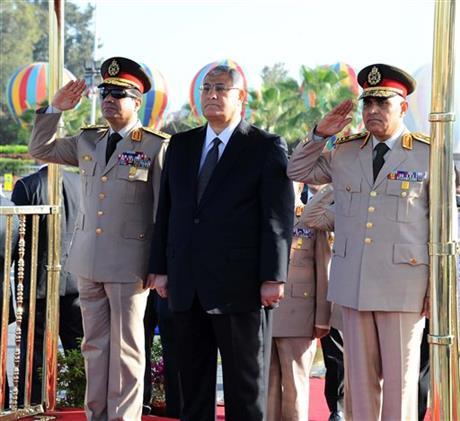
By MAGGIE MICHAEL
In this photo released by the Egyptian Presidency, Egypt’s interim President Adly Mansour, center, Defense Minister Abdel-Fatah el-Sissi, left, and other officials visit the Tomb of the Unknown Soldier and President Anwar Sadat’s memorial as part of celebrations marking the 40th anniversary of the start of the 1973 Middle East war in which Egyptian forces made initial gains against Israel, Saturday, Oct. 5, 2013. Egypt’s army is on high alert ahead of expected mass demonstrations by supporters of ousted Islamist President Mohammed Morsi timed to coincide with annual celebrations honoring the military, a combination many fear will lead to a new round of violence. (AP Photo/Egyptian Presidency)
CAIRO (AP) — Egypt’s powerful army chief said the Muslim Brotherhood acted “arrogant and tyrannical” while Islamist President Mohammed Morsi was in power, saying in an interview published Tuesday that Brotherhood leaders warned him of “terrorist attacks” if Morsi falls from power.
It was the first account by Gen. Abdel-Fattah el-Sissi has given of his ouster of Egypt’s first elected president on July 3. Since then, the military-backed interim government waged a full-fledged crackdown on the group, referring top leaders to courts for inciting murder and violence, rounding up hundreds of members and using deadly force against pro-Morsi protests, killing hundreds.
In its latest move aimed at dismantling the sprawling organization and hitting the pillars of its grassroots organization, the Cabinet revoked the permit for the Muslim Brotherhood Association, a non-government organization formed by the group earlier this year to provide it a legal face. The move showed the government’s determination to go beyond arrests, to dealing blows to the mere existence of the group.
The Cabinet said in a statement Tuesday that the decision is part of moves to carry out a sweeping Sept. 23 court ruling that banned the Brotherhood as well as “any institution branching out of it or … receiving financial support from it” and ordered its assets confiscated.
In the interview with the newspaper Al-Masry Al-Youm, el-Sissi said that the turmoil of the past three months could have been avoided if Morsi had responded to demands made by the gigantic demonstrations that began on June 30, demanding that he step down. El-Sissi said days after the protests began, he met with senior Brotherhood figures, including the group’s strongman Khairat el-Shater.
He said el-Shater warned him that the Brotherhood, which made up the backbone of Morsi’s administration, would not be able to control retaliation by Islamic groups in Sinai and other areas if Morsi were removed.
“El-Shater spoke for 45 minutes, vowing terrorist attacks, violence, killings by the Islamic groups,” el-Sissi told the paper. “El-Shater pointed with his finger as if he is shooting a gun.”
“His talk irritated me in an unprecedented way … because it showed arrogance and tyranny,” el-Sissi said. “I exploded and said … ‘What do you want? You either want to rule us or kill us?”
Addressing Islamists now in the wake of Morsi’s fall, el-Sissi said, “Watch out while dealing with Egyptians. You have dealt with Egyptians as if you are right and they are wrong … (as if) you are the believer and they are the infidels. This is arrogance through faith.”
Since Morsi’s fall, officials and allied media have depicted the Brotherhood and its Islamist allies as a threat to the nation, presenting the crackdown against them as a fight against terrorism. At the same time, there has been an escalation of violence by Islamic militants — many from groups allied to the Brotherhood — with near daily attacks on soldiers and police in Sinai and other parts of the country. On Monday, nine soldiers and policemen were killed, and attackers fired a projectile at the country’s main satellite communications station, in Cairo, punching a hole in a giant satellite dish.
The government’s move against the group comes hand in hand with deadly street confrontation. On Sunday, more than 50 people were killed in heavy security crackdown.
On Tuesday, Morsi supporters called off their plans to protest inside and around Cairo university campus after extensive security deployment basically closed the roads leading to the university and set up barbed wire on the roads to the campus. Armored vehicles also deployed at the gates of the sprawling campus, intimidating and warding off any attempt to gather there.
A leading Muslim Brotherhood figure in exile Ibrahim Mounier denounced the dissolving of the Brotherhood NGO as “hasty, illegal and random.” He said the government should have waited for a ruling by a higher court, expected on Saturday, regarding the association’s legality.
“This is a big conspiracy against the Egyptian people” he told Al-Jazeera Mubasher Misr television, speaking from London.
Outlawed for most of 85-year existence — with successive regimes alternating between repression and tolerance — the Brotherhood built its networks largely underground. That made it difficult for authorities to track, since many institutions were registered under individuals’ names.
When it rose to power, in the aftermath of 2011 uprising that forced longtime president Hosni Mubarak from power, it established its political arm, the Freedom and Justice party for the first time and won successive elections. Only in March, the group registered the non-government organization in March when Morsi was still in power after coming under pressure to legalize its status.
The shutting down of the NGO could make it harder to track down its finances and resources, though little of the organization falls under it.
“This NGO was the first step by the group to become legal, instead of keep pushing it to surface, this decision will only force it underground, back to square one,” said Amr Rafiq, leading member of Brotherhood’s ally aWasat party whose leaders are also imprisoned along with the group’s leaders.


